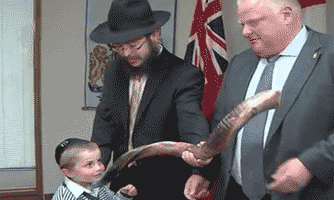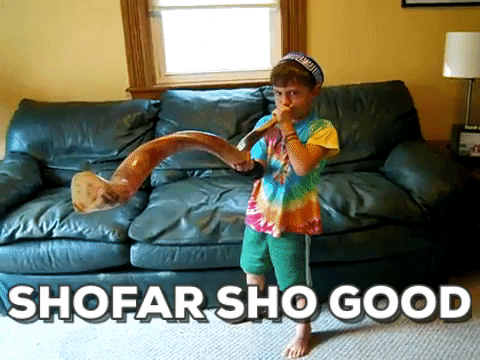|
שנה טובה (Shana Tovah) A happy new year to everyone! It's been quite the year transitioning to rabbinical school, and I'm going to do my best to keep the site a bit more active this coming year. To start the year, I wanted to share something a bit more serious than the normal fare here on The More Jew Know. The following is a personal reflection I shared last year from the Bimah (the "stage" at the front of the synagogue) on the second day of Rosh Ha'Shannah at Beth Israel Congregation in Ann Arbor, Michigan. It's a lot more words, and a lot fewer gifs than you're used to if you come here often, but I hope you find it meaningful. I started trying to write about the sounding of the shofar, but I’m going to do something a little bit different. I’m going to speak to you about a still small voice. A קול דממה דקה (Kol Dmama Daka). This is a voice that is only heard immediately after the shofar stops its call... and it reaches out to us through the silence that follows. We learn about this voice in the Unetane Tokef, the prayer we say during the musaf amidah when the chazan chants that a שׁוֹפָר גָּדוֹל יִתָּקַע!! A great shofar will sound!! וְקוֹל דְּמָמָה דַקָּה יִשָּׁמַע. And a still thin voice will be heard. And then the imagery that follows is both fantastic and terrifying: מַלְאָכִים יֵחָפֵזוּן Angels will hasten, וְחִיל וּרְעָדָה יֹאחֵזוּן a trembling and terror will seize them. What is it about this still small voice that makes it more impactful than the great blasts of the shofar? Why are the angels trembling with terror from this kol dmama daka? In the bible, the only place we hear of a kol dmama daka, the still, small voice, is in the book of מלכים, Kings, when Elijah is alone on the top of Har Carmel in northern Israel. Like our post-shofar silence, the kol dmama comes to Elijah only after his senses have been assaulted. First with a strong wind, then an earthquake, then a fire. Elijah looks and listens for God in each of these, but “the LORD was not in them.” When the voice, the small still voice finally comes, it asks him “מַה-לְּךָ פֹה אֵלִיָּהוּ” What are you doing here Elijah? It is that question, that haunting question that is there in the air hanging after we hear the sound of the shofar. “What are you doing here?” “What am I doing here?” Some years our answer to that question seems very clear, other years it’s half formed, and some years we are at a complete loss. But for that moment, that sweet and terrifying instant, when the קול דממה דקה talks to us, questions us, demand that we face this most basic question, that is the essence of ראש השנה (Rosh Hashannah) for me. But then why bother with the shofar at all? Why is it that we cannot simply all sit silently and wait to hear this still thin voice? Why not simply meditate in silence and wait for its appearance? Why do we only hear the קול דממה דקה, the kol dmama daka, after the שׁוֹפָר גָּדוֹל יִתָּקַע (shofar gadol itaka) the great blasts of the Shofar? Is it because you truly can’t have one without the other? For one thing, the Torah refers to Rosh HaShannah as Yom Truah, the day of blasts, so it would be difficult to blow it off completely. But that’s not the only reason for the sounding of the shofar… I don’t know about any of you, but when the shofar blows it consumes my mind and body. I am able to focus solely on the sound of the ram’s horn, feeling its vibrations in my bones, and when it ends I feel as though I am partially empty, like I had just been filled with this magic, transcendent substance that has been all of a sudden flushed away, leaving behind a shell, a cavity. It is into that space that the kol dmama daka comes in. Without allowing ourselves to become lost in the sound of the shofar letting it fill us up with its sound, we cannot make space for the still and small voice. So when the shofar sounds now, try to lose yourself in its call and be ready for the silence immediately after, when the קול דממה דקה (kol dmama daka) comes to ask us, “why are we here?” Wishing a sweet new year to all those celebrating, and may we all be inscribed in the book of life!
שנה טובה ומתוקה!!! Shana Tovah U'Metukah!!
0 Comments
Leave a Reply. |
About the JewThe Jew is an Uber driving, Bar Mitzvah DJing, yoga teaching ex-journalist from Ann Arbor, Michigan who attends rabbi School in NYC. Archives
October 2018
Categories |



 RSS Feed
RSS Feed
